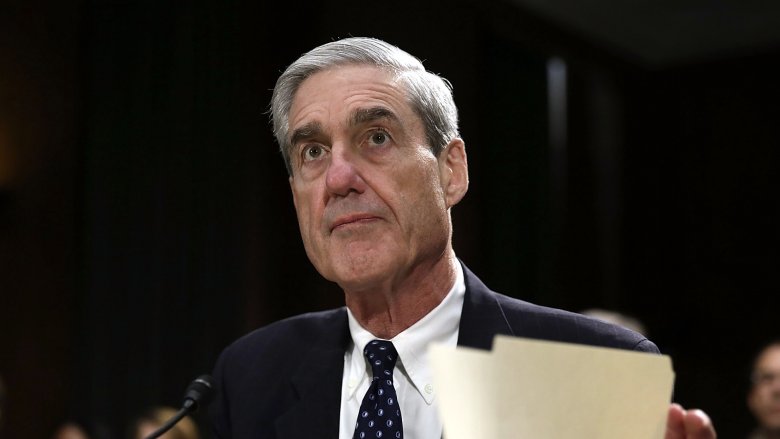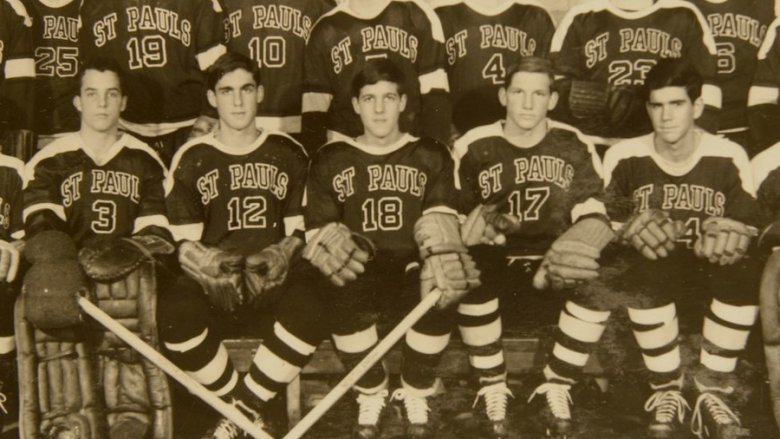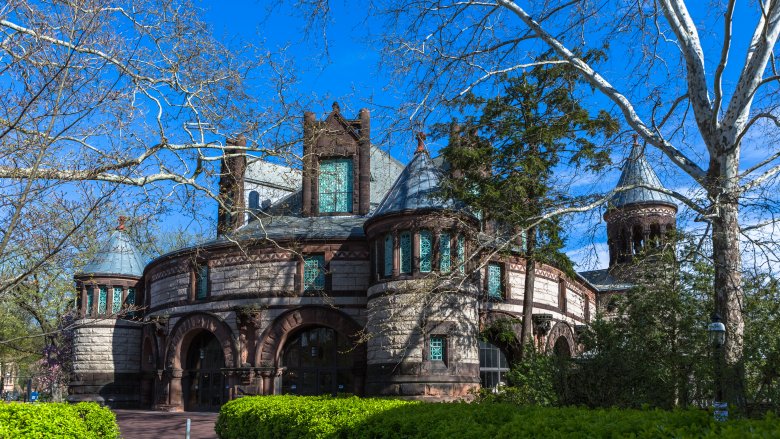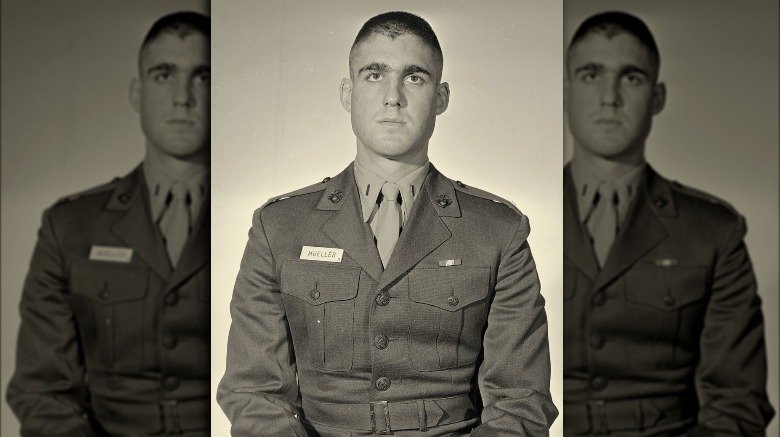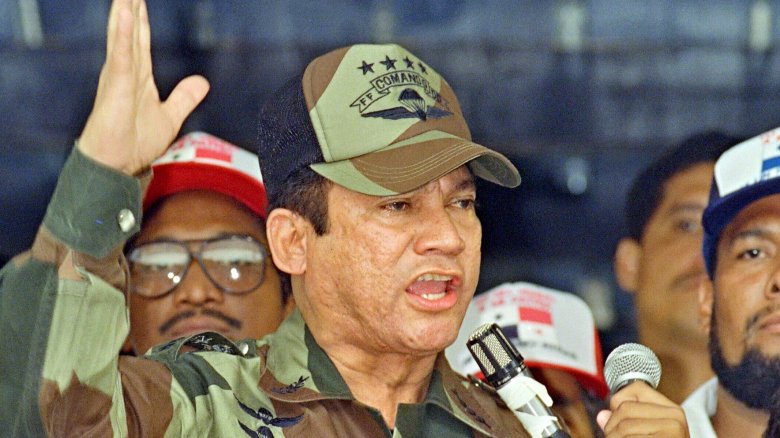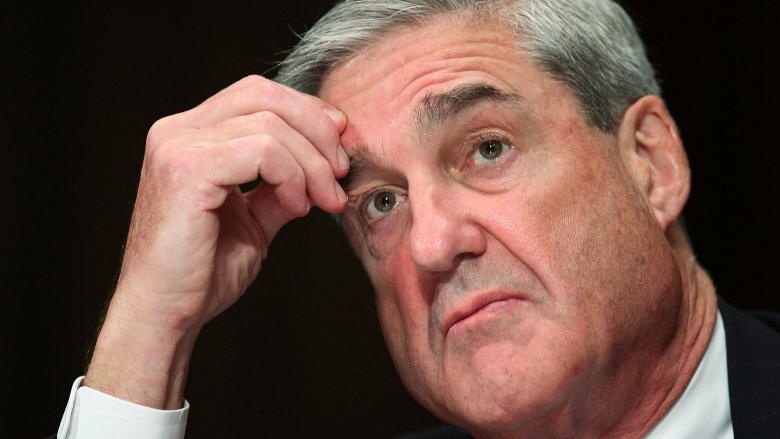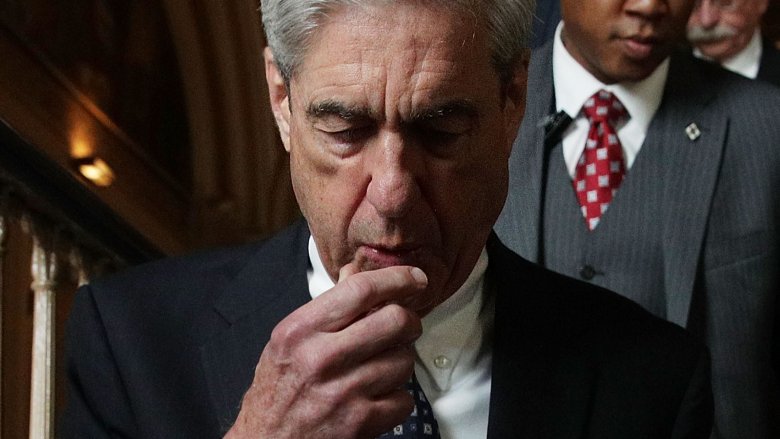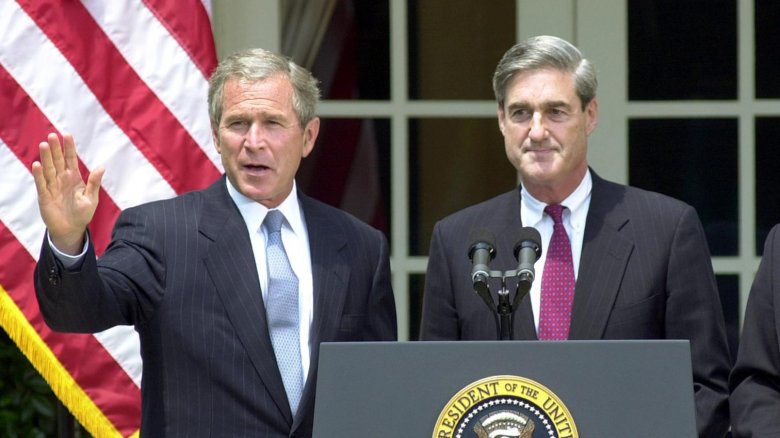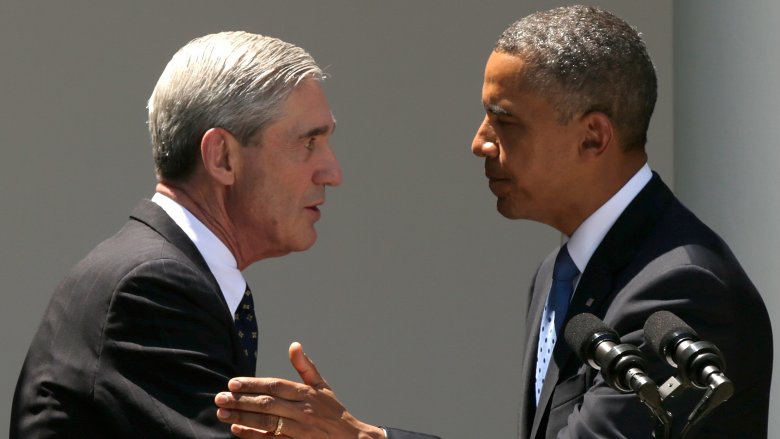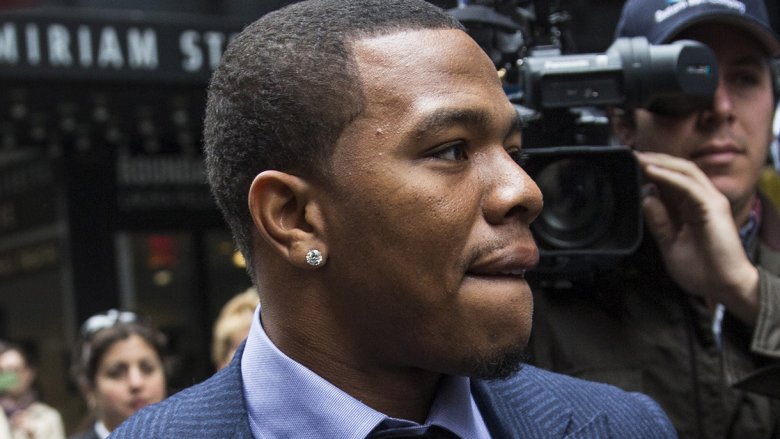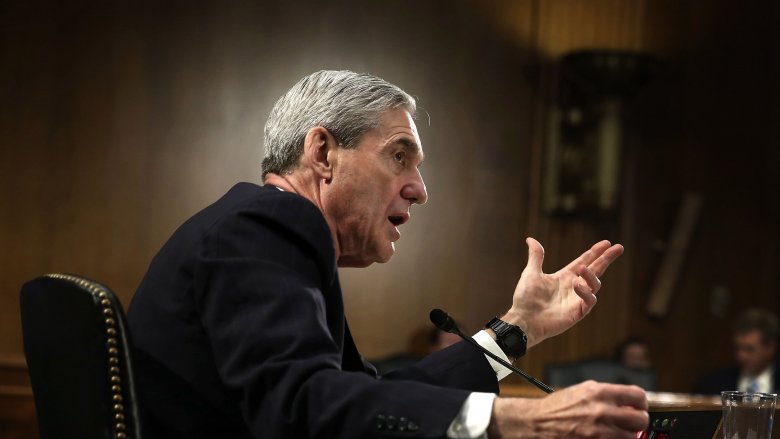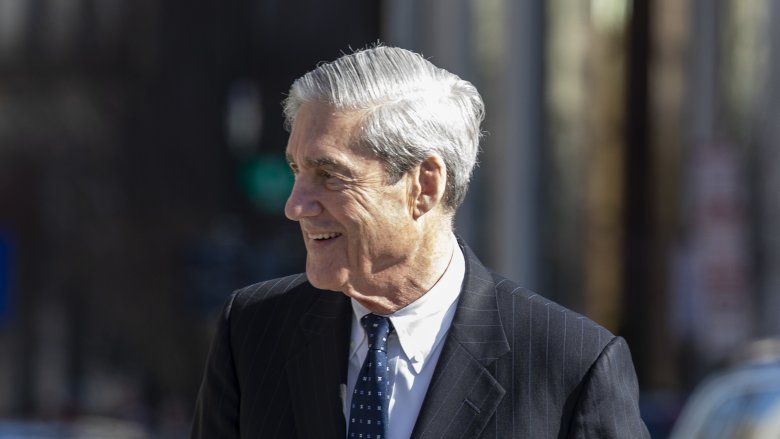The Untold Truth Of Robert Mueller
Robert Mueller has worn many hats. Once, he was either the man who would save democracy or the man who would destroy America, depending on your perspective. Now, he's just the man who ran in incredibly, obnoxiously tight ship of an investigation and then provided us with the most anticlimactic ending of all time. So now that the dust has cleared (to reveal pretty much nothing) and the Mueller report has neither saved democracy nor destroyed America, let's look at the man behind the report. Who exactly is Robert Mueller, and what pro-democracy, anti-America hole did he crawl out of? And what could he possibly be planning to do with his life now, since there isn't a single career choice he might make that could possibly be more anticlimactic than the thing he just subjected America to for the last 22 months?
Here's a look at the life of Robert Mueller and how he got to write a report that probably none of us will ever read in its entirety.
Surprise, he went to an elite private school
Like so many people who find themselves in high-profile positions of power, Mueller was born into wealth and privilege. According to the Washington Post, Mueller's father was a top executive at DuPont, which means he had dollars to spare and high standards as far as his son's education was concerned. Instead of attending an ordinary, nearby high school like us regular folk, Mueller went to St. Paul's School, an elite boarding school in New Hampshire (which today has an annual pricetag of $60,000). That not only provided the younger Mueller with a top-notch education and a relatively straightforward path to success, it also presumably ensured that the elder Mueller wouldn't have to bother with things like helping his son with homework or having dinnertime conversation with him.
Mueller (wearing #12) was an athletic kid, and he became captain of the soccer, lacrosse, and hockey teams. One of his hockey teammates was John F. Kerry (wearing #18), who would go on to become a senator, run a failed presidential campaign, and ascend to the role of secretary of state under Barack Obama.
Mueller's classmates remember him as an all-around nice guy with a good sense of humor, which is certainly plausible but hard to reconcile with the stoic, tight-lipped man who somehow managed to keep all of America in suspense for the better part of two years. He probably needed that sense of humor to get through the whole ordeal, even if we never saw it.
After he was done at elite private school, he attended an elite private college
Robert Mueller got into Princeton, like his father before him, and the Washington Post says he had plans to become a doctor. But one of his former classmates recalled that Mueller had a really hard time with organic chemistry, so he decided to change majors. In 1966, Mueller graduated with a bachelor's degree in politics. He wasn't finished, though — he also holds a master's degree in international relations from New York University and a law degree from the University of Virginia Law School, where he served on the law review.
After completing his education, Mueller tried and failed to land a job with the United States Attorney's office, so he joined a San Francisco law firm instead and eventually became assistant U.S. attorney for the District of Northern California. A long career in criminal justice followed — over the years, Mueller worked for several district attorneys and the Department of Justice before being appointed by George W. Bush to the role of acting deputy attorney general in 2001. That's probably where most of the world first heard the name "Robert Mueller," even if no one really took particular note of it.
Mueller was a bona-fide war hero
In the late '60s, somewhere between his master's degree and his law degree, Mueller did what almost no Ivy League graduate ever did — he joined the Marine Corps. Now, you have to remember that his decision to serve happened at a time when there was an epidemic of young men with severe and sudden cases of contagious anemia, ulcers, and bone spurs, which we're sure had nothing at all to do with the draft. Somehow, Mueller managed to avoid the anemia/ulcer/bone spurs epidemic, and he voluntarily went off to fight in Vietnam. According to the Washington Post, in a 2017 speech Robert Mueller said he was inspired to enlist by a classmate named David Hackett, who had also voluntarily joined the war effort the year before Mueller graduated.
Hackett did not survive the war, and Mueller says his friend's death strongly contributed to his own decision to enter public service. But first he had to finish being a war hero. For his distinguished service in Vietnam, Mueller was awarded the Bronze Star, two Navy Commendation Medals, the Purple Heart, and the Vietnamese Cross of Gallantry. Like other Vietnam vets, Mueller doesn't talk much about the war, at least not publicly, though he did tell one journalist that his time in the Marines taught him a lot about "follow-through and execution." "I've always made my bed and I've always shaved," he said, "even in Vietnam in the jungle. You've put money in the bank in terms of discipline."
He was involved in a bunch of high-profile cases
Right after Mueller got done serving as the assistant attorney general for the criminal division of the Department of Justice, he took a job working as a homicide prosecutor. If that sounds kind of like a demotion, well, let's just say it's not quite the six-figure salary he was getting from the DOJ. And it's not like Mueller thought that was the only job he could get, which is about the only reason most people would take a huge pay cut — according to CNN, he actually asked for the job because at that point in his career he wanted to follow his passion instead of his pocketbook. Admirable.
Before that, though, Mueller was involved in a few high-profile cases. He oversaw the prosecutions of mobster John Gotti and Panamanian dictator Manuel Noriega (above). He was also involved in the investigation of Pan Am Flight 103, which was bombed over Lockerbie Scotland in 1988. Lisa Monaco, who served as Mueller's chief of staff later in his career, told CNN that the Pan Am investigation had a profound effect on Mueller, especially after he viewed the wreckage, which included bits and pieces of the Christmas gifts passengers were taking home to their families. He was so affected, in fact, that when one of the bombers was released from prison in 2009, he wrote an angry letter to Scottish authorities, calling the move "a mockery of the grief of the families who lost their own."
Not everyone has awesome things to say about him (and not just Trump)
So far, Robert Mueller sounds super-admirable and completely beyond reproach. But not everyone has nice things to say about him, and we're excluding the guy in the White House from that statement because obviously.
Granted, most people in power make enemies. It just goes with the territory. But some of Mueller's former colleagues and aides say he isn't a great leader. According to the Los Angeles Times, Mueller has a "tendency to command, rather than inspire." When you come from an elite background like Mueller does, it's probably easy to expect respect rather than try to earn it, but who knows.
Another former colleague told the Times that Mueller "doesn't invite disagreement," which can make a leader really ineffective. He hasn't always demonstrated that he values his subordinates, once saying that re-assigning people within an organization was just like "moving the furniture." Not super motivating.
And all of his high-profile cases haven't been successes, either. Remember the anthrax attacks of 2001? Mueller was the guy overseeing that investigation, and the FBI completely bungled it. They spent years looking for proof that a virologist named Steven Hatfill was behind the attacks, even though the evidence pointed to Bruce Ivins, an Army anthrax scientist who committed suicide before he could be indicted. So it's not all accolades for Robert Mueller.
He was confirmed unanimously as director of the FBI
By the middle of 2001, the FBI was a public image nightmare. First, USA Today says there was its disastrous mishandling of confrontations in Waco, Texas, and Ruby Ridge, Idaho. There was also the small matter of Robert Hanssen, the FBI agent who became a Russian spy. And there was the fact that after nine long years, agents Scully and Mulder still couldn't tell us anything significant about those stupid gray aliens.
When Robert Mueller sat down before a Senate panel to sell himself as the best possible choice for FBI director, he had an awful lot to talk about, and some seriously grandiose promises to make. "If I have the honor of being confirmed by the Senate," he said to the panel, "I will make it my highest priority to restore the public's confidence in the FBI and to re-earn the faith and trust of the American people."
The Senate must have liked what he had to say because he was confirmed unanimously. And he didn't disappoint anyone in his new role, either, with the possible exception of those of us who are still waiting for someone from the FBI to come clean about those stupid gray aliens. Lame.
9/11 happened just days into his tenure as FBI director
Most people get to settle into a new job for a couple weeks before the real work begins. Your co-workers might welcome you to the team with a nice lunch, you spend a couple of days figuring out where the lunchroom is and arranging all the pictures on your desk, and you hope no one will ask you to do anything important so they don't find out how under-qualified you actually are. According to the University of Virginia School of Law, when Robert Mueller began his tenure as FBI director, it was just one week before the worst terrorist attack in U.S. history, September 11, 2001. So they had to cut that "welcome Robert" lunch a little short.
Mueller later said he was "scared to death" during the first meeting he had with George W. Bush to prep the president on what the FBI was doing in response to the attacks. And he didn't feel especially great about his performance that day, either, because Bush basically admonished him — not for his work trying to find out who was responsible for the attacks, but for not having a plan to stop additional terrorist attacks from happening in the future.
Mueller took Bush's words to heart, and under his leadership, the FBI began its transformation. Today it's no longer an agency that responds to terrible things, it's one that actively works to prevent terrible things. And Mueller is the guy who made that happen.
He threatened to resign from the FBI twice
Say what you will about Robert Mueller, he's a man of integrity. According to the Washington Post, George W. Bush found this out the hard way when he moved to reauthorize warrantless wiretapping in 2004, after the Justice Department had decided it was unconstitutional. Mueller was extra-not-cool with the move, and said he'd resign from the FBI if Bush went ahead with it.
That is the most famous instance of Robert Mueller threatening to resign, but it's not the only one. Mueller also threatened to resign after an incident involving an FBI investigation of U.S. Representative William Jefferson of Louisiana, who was accused of accepting bribes. Mueller authorized a raid on Jefferson's office, which rather tellingly raised the hackles of a whole bunch of other members of Congress, not that we're saying they all had things to hide or anything, but come on.
Anyway, there were a lot of people on both sides of the aisle who thought the FBI was overstepping its bounds, and White House aides ordered the bureau to return all the documents it seized. Mueller threatened to resign in protest, mostly because the order was an overflowing bucket of crap — the search warrant had been signed by a federal judge, the evidence was collected legally, and the White House didn't have the authority to make such a demand. The White House backed down that time, too, and Jefferson ended up going to prison on corruption charges.
He was the second-longest serving FBI director
J. Edgar Hoover was director of the FBI for 48 years, which in politician years is like a couple of centuries. Robert Mueller's years with the FBI don't really come close to that, but with 12 years of service he does have the distinction of being the second-longest serving FBI director. There's not much risk of either of those records being busted, either, since today FBI directors are technically limited to a 10-year term. (Mueller got an extra two years because Obama said he couldn't find a satisfactory replacement.)
Anyway, Mueller promised George W. Bush he would transform the FBI, and that's what he did. While he was in charge, a whole decade passed without another mass terrorist attack, although that streak was broken with the Boston Marathon bombings in 2013. Some potential attacks were foiled by citizens, but during that time the FBI thwarted a suicide bombing plot against the New York subway system, a plot against a Maryland military recruiting station, and a plan to attack an Oregon Christmas ceremony. So maybe Mueller is really a hothead who doesn't like to be disagreed with, but dang, maybe disagreeing with the dude is just a terrible idea in general.
He was hired by the NFL to oversee the Ray Rice case
Before we move on to the one case that everyone is going to remember Mueller for, the one that trumps (har har) all his other cases, there's one more high-profile investigation Mueller was involved in that you might remember. According to USA Today, Mueller was hired by the NFL in February 2014, the year after he left the FBI. What you probably want to hear now is that he became a coach or a commentator or a quarterback because that would be super-extra cool, but alas, the NFL actually hired him for his investigative skills. Mueller's job was to dig into the league's handling of the Ray Rice case. Rice, you might remember, was indefinitely suspended from the FBI after damning footage surfaced that showed him knocking out his fiancee in an elevator.
Mueller's team took close to four months to evaluate all the evidence and come to the shocking conclusion that the NFL "should have done more with the information it had, and should have taken additional steps to obtain all available information about the February 15 incident." Wow, you mean the NFL turned a blind eye to accusations of domestic abuse? How surprising.
As special counsel, he fit a very specific set of criteria
In 2017, the Justice Department had a dilemma. It needed to find a level-headed, stoic, doesn't-take-poop-from-anyone dude to investigate ... the president of the United States. The successful candidate had to be smart, experienced, non-partisan, capable of deflecting criticism, and immune to temptation. He (or she, but really almost definitely he) had to be faster than a speeding rumor, more powerful than the Washington political machine, and able to leap common POTUS-investigation pitfalls at a single bound, and as a bonus it would also be nice if he looked good in a cape. Unfortunately, Mueller didn't quite meet that final qualification, but Deputy Attorney General Rod Rosenstein thought he was mostly the right guy to get to the bottom of the Russian collusion question without unduly pissing anyone off.
According to the New York Times, Mueller's "unblemished reputation" was supposed to shield him from criticism and give lawmakers on both sides of the aisle the confidence that the investigation would proceed with dignity and professionalism. Also, his name kind of sounded like "Miller," so ordinary citizens could have fun wearing "Mueller Time" T-shirts. Finding another guy who was more qualified than that just wouldn't have been possible.
So what's next for Bob Mueller?
The investigation is over, and the anticlimactic document is in the hands of people who are going to try really, really hard to make sure that no one ever sees its worst parts, and now people on both sides all have a deep sense of having been cheated out of something, though none of us is really sure what. How does Mueller feel about everything that happened during the 22 months of investigation? Well, just hours after Mueller turned in his report, he went out to dinner at a restaurant in Washington D.C. because yeah, the guy really deserved a nice meal and a beer after 22 months of probing. Because no matter how much you're getting paid or how nice your alien spaceship is, all probing must come to an end.
So what's next for Bob Mueller? According to Business Insider, he could now be called upon to testify before Congress, though it's unclear what that would really accomplish since there's a 1999 law that limits what special counsels are allowed to say about their own investigations. He could also write a book, which is what Ken Starr did after he became infamous for his investigation of the Clinton administration. Or he could retire, or some combination of the above. The dude is in his 70s, and even without the Russia investigation he's had a pretty distinguished career. Whatever he decides to do, we wish him, at the very least, some peace and quiet.
